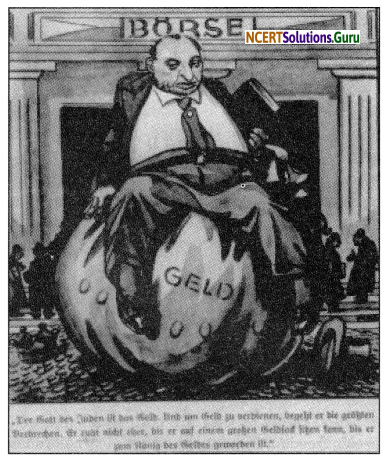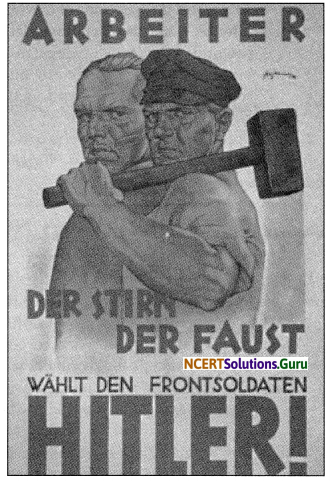Nazism and the Rise of Hitler Class 9 Questions and Answers Provided helps you to answer complex Questions too easily. You can use them while preparing for board exams and all of them are given by subject experts. Reading NCERT Solutions for Class 9 Social Science History Chapter 3 Nazism and the Rise of Hitler familiarizes you with the kind of questions appearing in the board exams. Students are advised to read these solutions on a regular basis to score well.
Nazism and the Rise of Hitler Class 9 Questions and Answers History Chapter 3
Make your learning experience enjoyable by preparing from the quick links available on this page. Use the Class 9 SST History Chapter 3 NCERT Solutions and get to know different concepts involved. All the Solutions are covered as per the latest syllabus guidelines. Knowing the NCERT Class 9 History Chapter 3 Questions and Answers helps students to attempt the exam with confidence.
Nazism and the Rise of Hitler NCERT Intext Questions and Answers
Question 1.
Read sources A and B given on NCERT text book page 61 and answer these questions:
(i) What do they tell you about Hitler’s imperial ambition?
(ii) What do you think Mahatma Gandhi would have said to Hilter about these ideas?
Answer:
(i) The two texts tell that Hitler’s imperial ambition was to conquer the whole of the earth. He believed that an aggressive nation will find ways to adjust its territory to its population size.
(ii) Mahatma Gandhi would have told Hitler to say good bye to the idea of aggression against other nations. One should not adopt violent methods because these give birth to only violence. One should believe in peace and make efforts to establish peace on every inch of the earth.
Question 2.
(i) What does citizenship mean to you? Look at chapters 1 and 3 and write 200 words on how the French Revolution and Nazism defined citizenship.
(ii) What did the Nuremberg Laws mean to the ‘Undesirables’ in Nazi Germany? What other legal measures were taken against them to make them feel unwanted?
Answer:
(i) To me, citizenship means the right to live freely in the country of my birth. A citizen of a country is the person who lives there permanently and enjoys certain rights which include right to life, property, worship and political rights.
The french people thought that all men have equal rights as they are born equal. The rights of a citizen include the right to life, freedom of speech, freedom of opinion and equality before law. They believed in the rule of law and that no one can be above it. It was the duty of the state to protect each citizen’s natural rights.
But the Nazi deformation of citizenship was totally different. It was defined with the perspective of racial discrimination against all except the ‘pure, and healthy Nordic Aryans’. They alone were considered desirable. All others such as Jews, Gypsies, Blacks, Russians, and Poles were classed as ‘undesirable’. These people were widely persecuted.
![]()
(ii) The Nuremberg Laws meant that the ‘undesirables’ had no right to live along with the other citizens. These included Jews, Gypsies, Blacks, Russians and Poles. The Nuremberg Laws were promulgated in 1935 and started the following points:
- Only persons of German or related blood would be German citizens enjoying the protection of the German Empire.
- Marriages between Jews and Germans were forbidden.
- Extra marital relations between Jews and Germans became a crime.
- Jews were forbidden to fly the national flag.
- Jewish business were boycotted.
- Jews were expelled from government services.
- Their properties were sold and confiscated.
Question 3.
How would you have reacted to Hitler’s ideas if you were:
(i) A Jewish women.
(ii) A Non-Jewish German woman.
Answer:
(i) If I were a Jewish women I would have condemned Hitler’s ideas which hated our community and women.
(ii) Even though I were a non-Jewish German woman, I would not have appreciated Hitler’s ideas because of two reasons – firstly, Hitler was excessively ruthless towards Jews and other communities. I believe in the principle – Live and Let live. Hitler never followed this principle and viewed Jews with extreme hatred. Secondly, Hilter was against woman’s presence in public domain. I would like to ask Hitler if possible who was he to restrict woman’s activities? Who was he to send Jews to concentration camp?
Question 4.
What do you think this poster is trying to depict?
Answer:

A Nazi poster attacking Jews.
Caption above reads:’Money is the God of Jews. In order to earn money he commits the greatest crimes. He does not rest, until he can sit on a big sack of money, until he has become the king of money.
This Nazi poster is making fun of Jews by depicting that they are only interested in making money. Money is the God for them. In order to earn money they can commit even the most heinous crimes. The poster is trying to show that Jews are greedy people and always run after money. They do not rest until they can make huge money.
![]()
Question 5.
Look at figures given below (Figs 29 and 30 NCERT T.B page 70) and answer the following: What do they tell us about Nazi propaganda? How are the Nazis trying to mobilise different sections of the population?

The poster shows how the Nazis appealed to the peasants.

A Nazi party poster of the 1920s. It asks workers to vote for Hitler, the frontline soldier.
Answer:
The Poster in the left side is addressed to the German farmer while poster in the right side is addressed to the German worker. The purpose of both these posters was to win the support of the working classes in Germany. However, the left side poster is condemning the capitalists and the Bolsheviks, because they are born of Jewish thought and hate Nazis. The right side poster makes appeals to them to vote for Hitler, because he is their only saviour. Both these posters tell us about the Nazi art of propaganda. They show how Nazis tried to mobilise different sections of the population for their selfish cause.
History Class 9 Chapter 3 NCERT Textbook Questions and Answers
Question 1.
Describe the problems faced by the Weimar Republic.
Answer:
The following problems were faced by the Weimar Republic:
(i) It was created at a time of confusion and chaos after Germany had lost the First World War. Many people that Germany had received a very harsh deal in the treaty of Versailles and they resented the government for requiring it and agreeing to its conditions.
(ii) The republic faced violent uprisings from various groups. Many of the people in Germany were Communists who wanted to being in a Russian style Communist government. As a result, Communist uprisings become common. For instance, in 1919 the Spartacist rebelled in Berlin.
(iii) The Weimar Republic’s main crisis occurred in 1923, when Germany refused to pay war reparations on time, which set off several events- a French invasion of the Ruhr, a general strike, hyperinflation, etc.
![]()
Question 2.
Discuss why Nazism became popular in Germany by 1930.
Answer:
(i) In 1919, Hitler took over the German workers’ party and renamed it the National Socialist German Workers’ Party which later came to be known as the Nazi Party.
(ii) The Nazis could not effectively mobilise popular support till the early 1930s. It was during the Great depression that Nazism became a mass movement.
(iii) After 1929, banks collapsed and business shut down. Workers lost their jobs and the middle classes were threatened with destitution. In such a situation, Nazi propaganda stirred hopes of a better future.
(iv) In 1928, the Nazi Party was not popular in the German parliament. But it had become the largest party by 1932.
(v) Hitler’s personality also proved a contributing factor in popularising Nazism in Germany. He was a powerful speaker. His passion and his words moved people. He promised to build a strong nation, undo the injustice of the Versailles treaty and restore the dignity of the German people.
(vi) Nazis held massive rallies and public meetings to demonstrate the support for Hitler and instil a sense of unity among the people. Nazi propaganda projected Hitler as a messiah, a saviour, as someone who had arrived to deliver people from their distress. These factors popularised Nazism in 1930s.
Question 3.
What are the peculiar features of Nazi thinking?
Answer:
The peculiar features of Nazi thinking are:
(i) There is no equality among people. Only the ‘pure and healthy Nordic Aryans’ were considered ‘desirable’. All others were classed as ‘undesirable’.
(ii) Germans who were seen as impure or abnormal had no right to exist. Under the Euthanasia programme, many Germans who were considered mentally or physically unfit were condemned to death.
(iii) The Jews were considered the lowest race. Gypsies, Blacks, Russians and Poles were considered sub-human and hence undeserving to any humanity.
(iv) Nazism believed in the theory of the ‘survival of the fittest’. The Aryan race was the finest. It had to retain its purity, become stronger and dominate the world.
(v) Nazism also believed that new territories had to be acquired for settlement. This would enhance the area of the mother country, while enabling the settlers on new lands to retain an intimate link with the place of their origin.
(vi) It was also a part of peculiarity of the Nazi thinking that all mothers were not treated equally. Women who bore racially undesirable children were punished and those who produced racially desirable children were awarded.
![]()
Question 4.
Explain why Nazi propaganda was effective in creating a hatred for Jews.
Answer:
(i) Nazi ideas were spread through visual images, films, radio, posters, catchy slogans and leaflets.
(ii) Propaganda films were made to create hatred for Jews. The most infamous films was the Eternal Jew in which orthodox Jews were stereotyped and marked.
(iii) They were shown with flowing breads wearing kaftans. They were referred to as vermin, rats and pests. Their movements were compared to those of rodents.
(iv) Orthodox Jews were also stereotyped as killers of Christ and moneylenders. Stereotypes about Jews were even popularised through maths classes. Children were taught to hate Jews.
(v) Nazi propaganda was so effective that a large section of people began to see the world through Nazi eyes, and speak their mined is Nazi language. They felt hatred and anger surge inside them when they saw someone who looked like a Jew.
Question 5.
Explain what role women had in Nazi society. Return to Chapter 1 on the French Revolution. Write a paragraph comparing and contrasting the role of women in the two periods.
Answer:
In Nazi Germany women were radically different from men. The fight for equal rights for men and women that had become part of democratic struggles everywhere was wrong and it would destroy society. While boys were taught to be aggressive, masculine and steel-hearted, girls were told that they had to become good mothers and rear pure-blooded Aryan children. They had to be the bearers of the Aryan culture and race. All ‘Aryan’ women who deviated from the prescribed code of conduct were publicly condemned, and severely punished. Those who maintained contact with Jews, Poles and Russians were paraded through the town with shaved heads and blackened faces.
But this was not the case with the French women. They asserted themselves during the French Revolution. In order to discuss and voice their interests women started their own political clubs and newspapers. Numerous women’s clubs were formed. Women demanded equal rights as men. The government responded to them. It introduced laws to improve their fives. Unlike Nazi women who were confined to home and hearth, the French women could train for jobs, could become artists or run businesses. They also won the right to vote. But women in Nazi Germany had no such right.
Question 6.
In what ways did the Nazi state seek to establish total control over its people?
Answer:
Adolph Hitler became the Chancellor of Germany in 1933. Having acquired power, he took a number of steps to gain total control over its people:
(i) Hitler set out to dismantle the structures of democratic rule. A mysterious fire broke out in the German parliament building in February facilitated his move. He passed the Fire Decree on 28 February, 1933. The Decree indefinitely suspended civic rights like freedom of speech, press and assembly that had been guaranteed by the Weimar Constitution.
(ii) Then he turned on the Communists and sent them to the newly established concentration camps. The repression of the Communists was severe.
(iii) On 3 March 1933, the famous Enabling Act was passed. This Act established dictatorship in Germany. It gave Hilter all powers to sideline Parliament and rule by decree.
(iv) All political parties and trade unions were banned except for the Nazi Party and its affiliates. The state established complete control over the economy, media, army and judiciary.
(v) Special surveillance and security forces were created to control and order society in ways that the Nazis wanted. The police, the storm troopers, the Gestapo, and the security service were given extraordinary powers to control people. People could now be detained in Gestapo torture chambers, rounded up and sent to concentration camps, deported at will or arrested without any legal procedures.
![]()
Class 9 History Chapter 3 NCERT Intext Activity Questions and Answers
Question 1.
Write a one page history of Germany.
(a) as a schoolchild in Nazi Germany
(b) as a Jewish survivor of a concentration camp
(c) as a political opponent of the Nazi Regime
Answer:
(a) As a schoolchild in Nazi Germany, I have been conditioned to behave in the way Nazis wanted. Like other school children, I was taught to be loyal and submissive, hate Jews and worship Hitler. I was told that the fight for equal rights of men and women was a thing of the past. It had no relevance today. Boys were taught to be aggressive and masculine and girls were told that they had to become good mothers and rear pure-blooded Aryan children. Girls had to maintain the purity of the race, distance themselves from Jews, look after the home, and teach their children Nazi values. All boys between the ages of six and ten had to go through a preliminary training in Nazi ideology. At the end of the training they had to take an oath of loyalty to Hilter, proclaiming him as the saviour of the country. Since I was a boy, I had to follow these rules and formalities.
(b) As a survivor of a concentration camp, I am thankful to God. I am happy to have survived several years of torturous life in the concentration camp. But I am a little bit sad because I have seen many of my friends and relatives dying before my eyes. Those horrible days! I can’t forget.
(c) As a political opponent of the Nazi regime, it is difficult for me to sleep peacefully even for a single minute. I am dead against Hitler and his ruthless policies but can do nothing because he is in power. I do not find any logic in Hitler’s policy of aggression. War brings only death and destruction but Hitler is not ready to understand it. He has become insensitive towards people of other communities and is spreading hatred everywhere. Let’s see what happens. I just pray to god to set Hitler on the right path.
![]()
Question 2.
Imagine that you are Helmuth. You have had many Jewish friends in school and do not believe that Jews are bad. Write a paragraph on what you would say to your father.
Answer:
Do it yourself.
Hope the data shared above regarding the NCERT Class 9 Social Science History Chapter 3 Nazism and the Rise of Hitler PDF has aided in your exam preparation. If you ever need any assistance you can always reach us and our team will guide you at the soonest possibility.